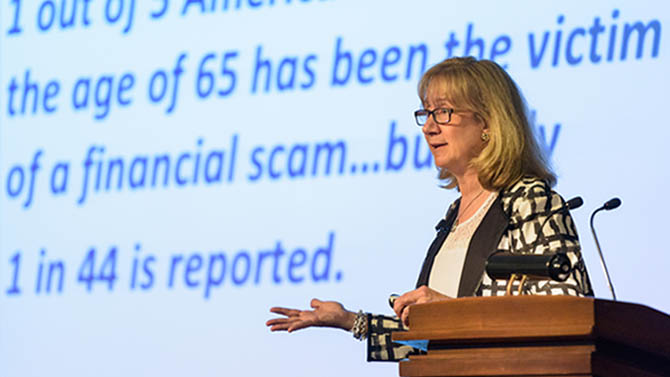


BATTLING ELDER ABUSE
Photo by Evan Krape May 20, 2016
UD hosts conference on elder abuse and exploitation
Last week’s Elder Abuse and Exploitation Conference drew professionals, advocates and concerned individuals from across Delaware and the region with the goal of better understanding elder abuse.
Hosted by the University of Delaware’s Center for Drug and Health Studies (CDHS) in partnership with the Division of Professional and Continuing Studies, the May 12 event focused on multidisciplinary approaches for addressing elder care and elder justice issues.
“We’ve all heard that it takes a village to raise a child; it also takes a village to prevent and address elder mistreatment and exploitation,” said conference organizer Sharon Merriman-Nai, associate scientist at CDHS. “More than one in 10 older adults will experience abuse, neglect, exploitation or self-neglect, and the consequences of mistreatment are dire: poorer quality of health, poorer quality of life, loss of independence, loss of financial stability, and for some, even premature death. We all have a role to play, and need to understand how our roles interlock.”
The event featured several nationally known speakers, including Elizabeth Loewy, general counsel and senior vice president at EverSafe, a technology company focused on the prevention of financial exploitation and identity theft in later life.
Formerly the chief of the New York County district attorney’s elder abuse unit, Loewy successfully prosecuted the complex and highly publicized financial exploitation case involving philanthropist and socialite Brooke Astor.
Recounting several high-profile elder abuse cases she helped prosecute, Loewy characterized elder financial abuse as an “invisible epidemic,” with statistics showing that while one out of five Americans over the age of 65 experience financial abuse or scams, only one in 44 cases is reported, due to a variety of circumstances including guilt, shame, economic dependence, fear of isolation and cognitive challenges.
Among Loewy’s cases was the widely covered financial exploitation case involving socialite Brooke Astor, affectionately known as “New York’s first lady of philanthropy.” The story was chronicled nationally by the press with events culminating in a six-month criminal trial and conviction of Astor’s son and one of her lawyers for charges that included grand larceny and forgery relating to Mrs. Astor’s estate.
Featured speaker Philip Marshall, historic preservation professor and grandson of Brooke Astor, movingly shared his family’s experiences. In 2006, after years of increasing concern over his father’s handling of Mrs. Astor’s finances, Marshall, with the help of others, sought a petition for guardianship for his grandmother and eventually became involved in the battle over his father’s actions.
“My grandmother would never want to be known as one of America’s most famous cases of elder abuse,” said Marshall. “Yet, the sad circumstances surrounding my grandmother have informed a timely, and timeless, cause in elder justice.”
Marshall cited the cooperation and teamwork of caring friends and caregivers as the key factor in their ability to ultimately provide the oversight, care and living arrangement that his grandmother had wished for. “Her abuse galvanized a collective response by family, friends, staff, and caregivers all united by compassion and a common cause. The strength of our diversity contributed much to our success, and I later learned this was an informal ‘multi-disciplinary team.’”
Added Marshall, “Once we took action, it was clear that we were addressing a much greater, national issue,” commenting that at age 104, his grandmother “unknowingly entered her ‘encore career’ as an advocate for elder Americans.” Marshall has testified before the U.S. Senate Special Committee on Aging and delivers keynote addresses across the country, focusing on awareness and prevention, supportive decision making and elder financial protection.
UD’s Karen Stein, associate professor in the School of Public Policy and Administration and a nationally recognized leader on elder abuse issues, was a conference organizer and featured speaker.
Commenting on both the current and future environment for serving Delaware’s older and vulnerable populations, Stein observed, “If we apply the national statistics to Delaware population numbers, it’s possible that 17,200 older Delawareans are at risk for abuse, neglect or exploitation but only 1,200 cases may come to the attention of authorities.”
“However, there are new developments unfolding that hold promise for substantially increasing our knowledge of the known world of elder abuse,” said Stein. “Federal attention to elder justice has never been at a greater level; federal funding is moving away from demonstration projects towards outcomes-based research to find out what really works; and the research community is coalescing around methodological and ethical standards to advance large-scale experimental studies.”
The conference featured a wide array of panel discussions and presentations from stakeholders and experts from across Delaware, including presenters from the Delaware Attorney General's Office, Department of Health and Social Services, UD faculty and the private sector.
Delaware Secretary of Health and Social Services Rita Landgraf was a featured speaker, discussing trauma-informed health and social care initiatives that are being implemented or are emerging in the region to address the needs of older patients and clients.
Presenters representing the University of Delaware included Veronica Rempusheski, the Jeanne K. Buxbaum Chair of Nursing Science and professor of nursing, leading a session on “Nurses' Roles and Responsibilities Pertaining to Elder Abuse.” Karla Bell, assistant professor of physical therapy and director of clinical education, joined by Rempusheski and others, served as panelists in the event’s closing forum, “Solving the Puzzle: Working Together to Prevent Elder Abuse.”
When closing her remarks, Elizabeth Loewy asked, “Is there any good news?”
She pointed to the positive outcomes and remedies achieved in criminal court, also citing multidisciplinary teams, civil and criminal litigation, education efforts aimed at consumers, law enforcement and the community; and prevention through technological innovation as instrumental in the future effectiveness of addressing elder abuse and elder justice issues.
For more information about speakers and topics, visit the conference website.
Contact Us
Have a UDaily story idea?
Contact us at ocm@udel.edu
Members of the press
Contact us at mediarelations@udel.edu or visit the Media Relations website

